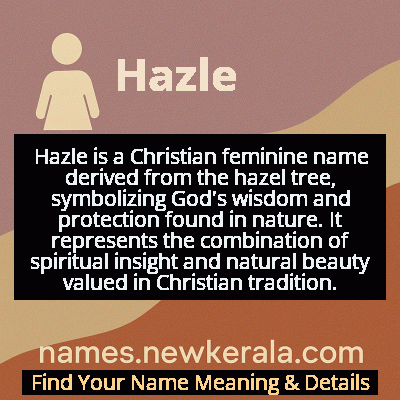Hazle Name Meaning & Details
Origin, Popularity, Numerology Analysis & Name Meaning of Hazle
Discover the origin, meaning, and cultural significance of the name HAZLE. Delve into its historical roots and explore the lasting impact it has had on communities and traditions.
Name
Hazle
Gender
Female
Origin
Christian
Lucky Number
7
Meaning of the Name - Hazle
Hazle is a Christian feminine name derived from the hazel tree, symbolizing God's wisdom and protection found in nature. It represents the combination of spiritual insight and natural beauty valued in Christian tradition.
Hazle - Complete Numerology Analysis
Your Numerology Number
Based on Pythagorean Numerology System
Ruling Planet
Neptune (Ketu)
Positive Nature
Intuitive, analytical, spiritual, and inquisitive.
Negative Traits
Secretive, reserved, aloof, and can be overly critical.
Lucky Colours
Green, yellow.
Lucky Days
Monday.
Lucky Stones
Cat’s eye, moonstone.
Harmony Numbers
1, 5, 6.
Best Suited Professions
Scientists, researchers, spiritual leaders, detectives.
What People Like About You
Depth of knowledge, analytical skills, spirituality.
Famous People Named Hazle
Hazle McCallien
Botanist and Educator
Pioneered studies in plant ecology and mentored generations of female scientists
Hazle Dawnay
Philanthropist
Founded charitable organizations focused on women's education and child welfare
Hazle Buchan
Musician and Composer
Composed liturgical music still used in Christian worship services
Name Variations & International Equivalents
Click on blue names to explore their detailed meanings. Gray names with will be available soon.
Cultural & Historical Significance
The name gained popularity during the Victorian era when nature-inspired names became fashionable among Christian families, seen as reflecting God's creation. In American Christian communities, particularly in the Appalachian region, Hazle emerged as a distinctive spelling that maintained the name's connection to protection lore - where hazel branches were traditionally used to ward off evil spirits, paralleling Christian protection prayers. This dual significance as both a natural and spiritually protective name has maintained its appeal across generations of Christian naming practices.
Extended Personality Analysis
Women named Hazle are often perceived as possessing a unique blend of practical wisdom and intuitive insight. They tend to be grounded individuals with strong analytical abilities, much like the hazel tree's association with wisdom and divination in folklore. Their personality typically combines a calm, nurturing presence with sharp observational skills, making them excellent problem-solvers who approach challenges with both logic and compassion.
Hazles are frequently described as protective and loyal in their relationships, embodying the hazel's historical role as a guardian tree. They often demonstrate remarkable resilience and adaptability, able to thrive in various circumstances while maintaining their core values. Their communication style tends to be thoughtful and measured, with a natural ability to mediate conflicts and bring harmony to their social circles. Many Hazles develop strong connections to nature and tradition while remaining open to modern ideas and innovations.
Modern Usage & Popularity
Hazle maintains a steady presence in modern naming practices, particularly among Christian families seeking traditional yet distinctive names. While less common than the standard Hazel spelling, Hazle has experienced a modest revival in recent years as parents look for unique variations of classic nature names. The name finds particular popularity in the American South and Midwest, where traditional Christian values often influence naming choices. Current usage trends show Hazle appearing more frequently as a middle name than a first name, though it maintains its appeal for parents wanting a name that feels both vintage and fresh. Social security data indicates sporadic but consistent usage, with the name never completely disappearing from birth records.
Symbolic & Spiritual Meanings
Symbolically, Hazle represents wisdom, protection, and divine inspiration across multiple traditions. The hazel tree has long been associated with knowledge and poetry in Celtic mythology, while in Christian symbolism it connects to the concept of God's wisdom being hidden within creation like the nut within its shell. The hazel rod appears in various folk traditions as a tool for finding water or treasure, symbolizing the ability to uncover hidden truths and spiritual insights. As a protective symbol, hazel branches were traditionally placed in homes and barns to ward off negative energies, paralleling Christian practices of blessing homes and spaces. The tree's flexibility and strength also make it a symbol of resilience and adaptability in the face of life's challenges.

